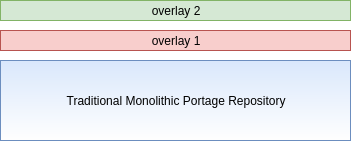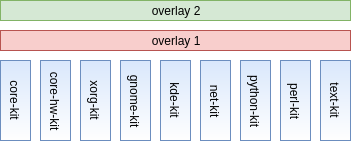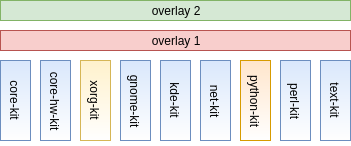Difference between revisions of "FAQ"
| Line 3: | Line 3: | ||
|fields=question,answer,category,last_updated | |fields=question,answer,category,last_updated | ||
|format=dynamic table | |format=dynamic table | ||
|details fields=category,last_updated | |||
}} | }} | ||
Revision as of 20:31, November 21, 2018
| question | answer | |
|---|---|---|
| question | answer | |
| Do we plan on expanding support for other architectures, or focus on the currently listed hardware arches? | {{{answer}}} | |
| Do you support Systemd? | Part of the distinctiveness of Funtoo Linux is its dependency-based OpenRC init system, so changing this would make it something other than Funtoo Linux. So we do not support systemd as part of Funtoo Linux.
We do support running modern versions of GNOME (currently 3.34 as of the time this FAQ entry was updated, in March 2020) even without systemd. We are planning to develop a new OpenRC-style init system, incorporating "next-gen" features, which will be comparable in functionality to systemd and offer some systemd compatibility where it makes sense. | |
| Do you use Gentoo Linux system profiles? | Funtoo Linux uses a novel multi-profile system which you can read about at Funtoo Profiles. It has a lot of cool functionality, including flavors, mix-ins and other cool things. | |
| Does Funtoo have an installer as an option? | Currently, Funtoo does not have an installer but relies on a streamlined version of the Gentoo installation process. We do pre-ship a pre-built universal kernel so that installation is less complex compared to Gentoo. | |
| Does Funtoo Linux have an overlay? | Funtoo Linux uses a system called kits, which organizes the Portage tree into logical groupings, such as xorg-kit, gnome-kit, etc. Kits are essentially overlays that are specially designed to work together. But our kits are not designed to be used directly with Gentoo Linux. Although it can be done (kits are essentially overlays,) they are not designed to work this way and you won't always get the right versions of packages. | |
| How did Funtoo Linux Begin? | Funtoo Linux was created by Daniel Robbins, the creator and former Chief Architect of Gentoo Linux, in late 2007, as a means to get Gentoo to build reliably (see Funtoo Linux History for an accurate timeline.) This led to the adoption of Metro, an automated build tool also developed by Daniel, to replace Gentoo's catalyst build tool for building Funtoo stages.
Some changes to Gentoo's Portage tree were needed to produce reliable stage3 builds of Gentoo, creating the need for Daniel to create a slight variant of Gentoo's Portage tree to support automated builds. This in turn created the need to maintain a forked Portage tree that also integrated recent upstream Gentoo changes. Daniel adopted git and worked with Zac Medico to integrate support for git-based Portage trees and mini-manifests into Gentoo's emerge command at a time when adoption of git by Gentoo had stalled. Over time, Funtoo Linux has continued to mature, supporting novel offerings such asdebian-sources and debian-sources-lts kernels, multiple system profiles, a wide selection of stages optimized for modern CPUs, support for systemd-less GNOME, and our new kits system. | |
| How do I become a Funtoo developer? | First, we want you to be a Funtoo Linux user. Funtoo Linux is a project run by users. Then, see Contributing. | |
| How do I report a bug? | We have a bug tracker! :) See Reporting Bugs. | |
| How do I start using Funtoo Linux? | For information on how to start using Funtoo Linux, see the installation instructions. | |
| How do I tell whether to report a bug to Gentoo or Funtoo? | Let us figure this out for you. Report a bug to our bug tracker, and we will determine how to resolve the issue. See Reporting Bugs. | |
| How do I update my Portage tree in Funtoo? | This is done by typing:
'"`UNIQ--console-00000000-QINU`"' This will update Funtoo's meta-repo. Ego will use thegit pull command to update your meta-repo and kits for you, or will use git clone if meta-repo doesn't yet exist. | |
| Is Funtoo Linux a fork of Gentoo Linux? | Funtoo Linux is not a full fork of Gentoo Linux, but we do fork some ebuilds.
It's more accurate to refer to Funtoo Linux as a Gentoo Linux variant, meaning that it is more like another flavor of Gentoo than a fork. We do try to collaborate with Gentoo developers when possible. | |
| Is Funtoo similar to Gentoo in that it is intended for developers and network professionals, as well? | {{{answer}}} | |
| Is it possible to convert an existing install of Gentoo Linux to Funtoo Linux? | Yes, it is possible, but not supported. Some people have done it, but you should not rely on it to always work. It is always best to install Funtoo Linux by following the steps in our installation documentation. If you proceed to convert an existing Gentoo system to Funtoo, be aware that it may not work, and we will not officially support you if you get stuck, so you may have to install from scratch anyway. However, there are people on the forums or on online chat who might be willing to help you out. | |
| What are Funtoo Kits? | The best way to answer this question is visually. First, let's take a look at a traditional, monolithic Portage tree:
Kits utilize the same overlay technology that is built into Portage, but rather than use them to create overlays that are designed to go 'on top' of each other, this technology is used to create logical collections of packages that are meant to exist 'side by side'. These groupings are called kits, and the visualization of kits might look something like this:
You might be wondering -- can you use kits with traditional overlays? Yes, indeed you can. This might looks something like this:
The other question commonly asked is simply "why kits?" Kits are our attempt to logically organize the very large and unwieldy Portage tree into logical groups. As we continue along in this effort, it starts to become possible to 'swap out' one version of a kit for another, so for example running a more recent xorg-server and GNOME that is in the main distribution, which may look something like this (with the "special" colored kits representing newer kit versions.)
| |
| What do I do if a package in Gentoo isn't available on Funtoo | See https://www.funtoo.org/Reporting_Bugs Issue type "Tracker". | |
| What is the focus of Funtoo? | Funtoo focuses on providing a fairly up-to-date (but not bleeding edge) meta-distribution. On the server side, we focus on production server deployments, and this is why we use debian-sources-lts as a default kernel -- because we trust it in production. On the desktop side of things, we focus on making Funtoo an ideal professional creator workstation, focusing on media creation, productivity as well as scientific work. | |
| What is the length of LTS support and when do other version reach their EOL? | Currently, 1.4-release is not an LTS release. At some point we will ask the Funtoo user community whether continuing to maintain 1.4 makes sense or if efforts are best spent elsewhere. If the upgrade path to next release is relatively straightforward (and so far it appears to be) then we may make the decision to deprecate 1.4 as users can easily transition to next for any updates they need. We’re maintaining 1.4 as a stable release but it is not LTS, and next is recommended 1.4 should only be used by people who really need it. | |
| What is the license of the Funtoo wiki content? | Unless otherwise noted, the license of the content on the wiki is available for your use under the terms of -- at your option -- the GNU Free Documentation License 1.3, or the Creative Commons CC-BY-SA, 3.0. | |
| What kernel does Funtoo Linux use? | We include a pre-built debian-sources-lts (long-term-stable) kernel and initramfs in stage3 tarballs by default which is ready for use and offers universal hardware support, and also offer up-to-date debian-sources kernels in our Portage tree. Funtoo Linux users are free to choose their own kernel. These are documented on the Funtoo Linux Kernels page. | |
| Why is the project named "Funtoo"? | Well, I originally created the Gentoo Linux distribution. The "Gentoo" name was originally suggested by Bob Mutch. I am not sure if it was his original idea or if he simply relayed the idea to me from an IRC conversation he was part of. But the "Gentoo" name seemed to resonate with people. At the time, we were looking for a replacement name for "Enoch Linux", which was the existing name of the distro. As for Funtoo, well, Funtoo is sort of a play of words on Gentoo. I started Funtoo a few years after retiring from Gentoo, and I wanted a fun environment to work. Thus, Funtoo. I think "Funtoo" has grown to reflect the human side of technology -- we are people, using technology for various tasks. We want the technology to be useful but also be enjoyable to use. And we want our communities to be an enjoyable place to be a part of. | |
| Why use a source-based distribution like Gentoo or Funtoo Linux, instead of a binary distro? | Using a source-based Linux distribution like Funtoo Linux could be likened to driving an exotic sports car. It's an experience that is appreciated by professionals and technology enthusiasts because it simply offers a more direct, engaging experience with the underlying technology. You can push the technology further. You have more control. It is more satisfying. If you aren't looking for something "special", there are a number of binary-only Linux distributions to choose from. They will get you from point A to point B. You won't have as much fun or be as connected to what's going on, nor as much control, but maybe that's not what you're looking for. | |
| {{{question}}} | {{{answer}}} |




